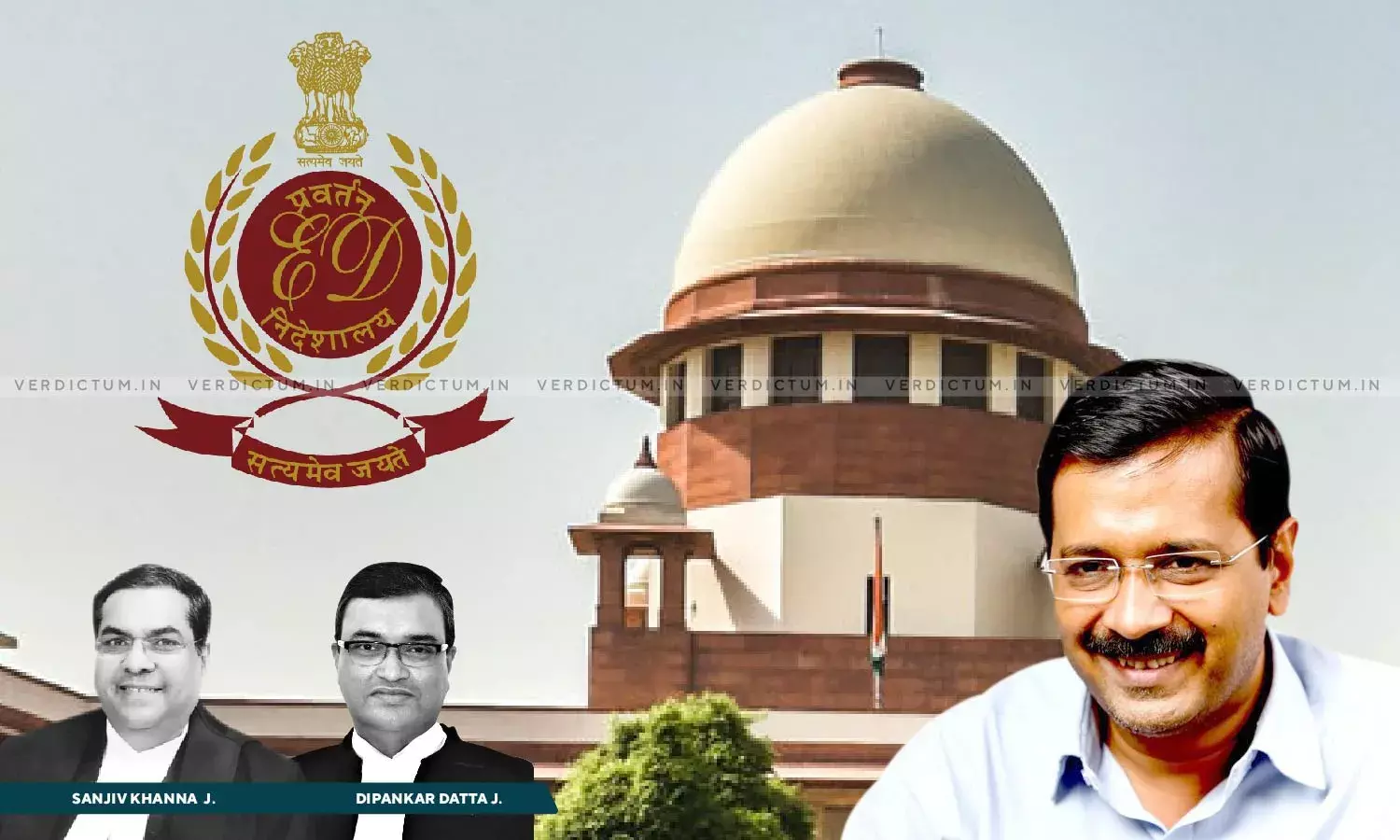Breaking | "Mere Interrogation Does Not Allow Arrest": Apex Court Releases Arvind Kejriwal On Interim Bail In ED Case
While observing that mere interrogation does not allow arrest, the Supreme Court has granted interim bail to Arvind Kejriwal in ED case related to the allged Excise Policy Scam.
The Bench of Justice Sanjiv Khanna and Justice Dipankar Datta clarified at the outset that they have not examined the question of bail but have only gone into the question of what are the parameters of Section 19 Prevention of Money Laundering Act (PMLA) and what is the jurisdiction of the Court to go into the grounds of arrest.
"We have explained the difference between Section 19 and 45 of PMLA, saying that as far as Section 19 is concerned, it is a subjective opinion of the officer, whereas under Section 45, it is an exercise undertaken by Court itself and not by the officer. So, the power of the Court is different from the power of the officer," the Court said.
The Court said that whether the issue of need and necessity of arrest can be read into Section 19 of the PMLA, especially in view of Doctrine of Proportionality has been referred to the larger bench. "We have also referred to the data, that very few arrests are being made. So, what is the policy of arrest, and what is the basis for which need and necessity of arrest takes place, that issue we have referred to the larger bench," the Court added.
The court had framed 3 questions:
a) Whether the need and necessity of arrest is a separate ground to challenge the order of arrest passed in term of Section 19 (1) of the PMLA
b) Whether the need and necessity of arrest refers to the satisfaction of the common parameters of arrest and to a person take into consideration or it related to other personal grounds and reasons, regarding the necessity to arrest a person in the facts and circumstances of the case
c) If questions, a and b are answered in an affirmative, what are the parameter facts that are to be taken into consideration by the court to examine the question of need and necessity of arrest.
"Mere interrogation does not allow you to Arrest, that's not a ground under Section 19," the Court remarked.
The Court held, "Given the fact that right to life and liberty is sacrosanct, and Arvind Kejriwal has suffered incarceration of over 90 days and the questions above require consideration by a larger bench, we direct Arvind Kejriwal will be released on interim bail...on the same terms and conditions as were imposed by order dated May 10."
Pertinently, on May 17, the Bench had reserved order in the plea. Meanwhile, Kejriwal was granted bail by Trial Court, which was later stayed by the Delhi High Court.
It is also to be noted that Kejriwal has also been arrested by the CBI in the Excise Policy Case. He has challenged the same before the High Court and has also moved a Bail plea in the corruption case; the same is scheduled for hearing on July 17. On July 5, the Single-Judge Bench had issued notice in the Bail plea.
On May 10, the Court had granted Interim Bail to the Delhi Chief Minister till June 1. On May 7, the Bench had clarified that, if it releases Kejriwal on bail, it does not want him to perform official duties.
Earlier, the Court had observed that it may consider granting interim bail to Kejriwal on account of elections. Earlier on April 29, the Bench had asked the Senior Counsel appearing for the Delhi CM, "Why have you not filed any Application For bail?"
Previously, the Enforcement Directorate had filed an extensive affidavit-in-reply to the Special Leave Petition by the Delhi Chief Minister, Arvind Kejriwal, assailing the order passed by the Delhi High Court upholding the arrest and remand in the money laundering case. In its reply, the ED had alleged that Arvind Kejriwal is the kingpin and key conspirator in the Delhi Liquor Policy Excise Scam, responsible for the mass destruction of evidence, and the main facilitator of the new policy for the bribe givers.
The ED had earlier, stated in its affidavit that there are reasons to believe, based on material in possession, that Kejriwal is guilty of the offence of money laundering. The ED had also made a comparative table to demonstrate the changes made that were allegedly arbitrary and irrational, made only to ensure large-scale profits to the bribe givers. It was also stated by the ED that Arvind Kejriwal was asked to provide the password to his mobile phones again and again, but he refused to share the same and even his statements during custody would reveal that despite being confronted with materials, the petitioner chose to give completely evasive answers.
Cause Title: Arvind Kejriwal v. Directorate of Enforcement [SLP (Crl) No. 5154/2024]
Click here to read/download Judgment




